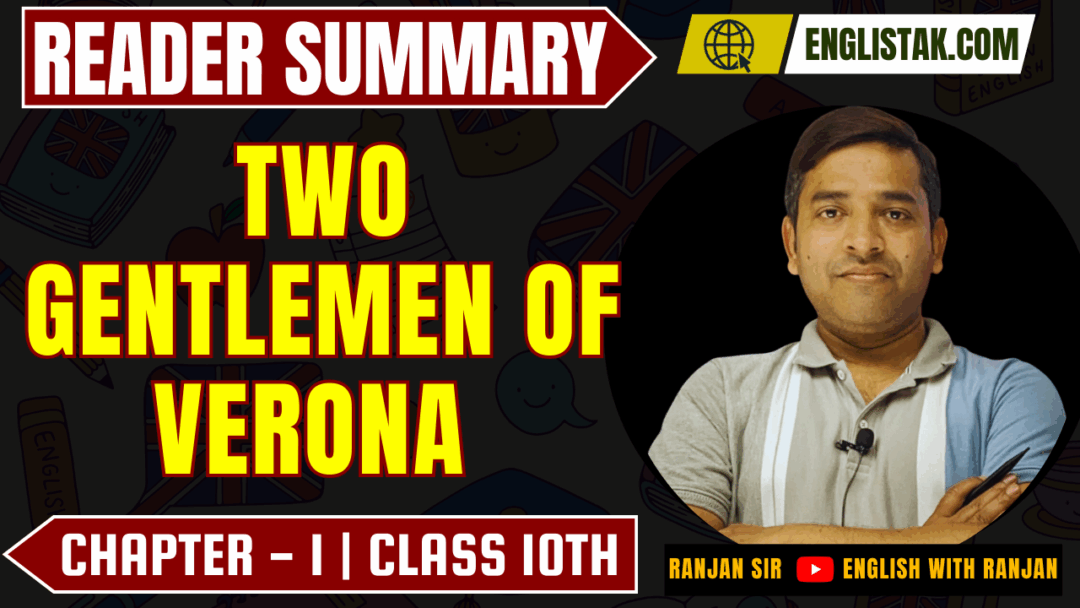![]()
NCERT English Two Gentlemen of Verona Summary Class 10 English
Table of Contents
🌸 Two Gentlemen of Verona Summary Class 10 English – A Story of Silent Sacrifice and Unshaken Spirit – In a world often driven by self-interest, the story Two Gentlemen of Verona by A.J. Cronin stands as a moving tribute to the power of love, sacrifice, and resilience. Set in post-war Italy, this touching narrative follows two young brothers—Nicola and Jacopo—whose worn clothes and humble jobs belie a strength of character far beyond their years. At first glance, they appear to be just poor street children selling strawberries and shining shoes in Verona. But behind their innocent smiles lies a story that melts the heart and restores faith in humanity.
This blog dives deep into the summary and key themes of Two Gentlemen of Verona, revealing how two little boys, battered by war but powered by duty and affection, become the true heroes of life. Read on to discover the story that proves heroism isn’t always found on the battlefield—it often lives quietly in the hearts of those who give everything for love.
Two Gentlemen of Verona Summary Class 10 English
1. Meeting the Boys on the Verona Road
While motoring through the foothills of the Alps toward Verona, the narrator and his friend stop for two ragged boys— Nicola (13) and Jacopo (nearly 12)—who are selling wild strawberries. Their driver Luigi warns that better fruit can be bought in town and scorns the boys’ shabby look, but the travellers feel an immediate, inexplicable attraction and buy a large basket.
2. Versatile Child‑Workers of the Piazza
Next morning, the visitors find the same brothers shining shoes in Verona’s main square. The boys explain that they do “many things”: sell fruit, polish shoes, hawk newspapers, take tourists to Juliet’s Tomb, arrange opera tickets—whatever honest work they can find.
Despite their youth they display unusual maturity, discipline, and courtesy, impressing the narrator throughout the week as they tirelessly meet every request under the scorching summer sun.
3. Midnight Vigil & the Mystery of Their Earnings
One windy night the narrator discovers the exhausted pair dozing on the pavement, waiting for a late bus so they can sell the last newspapers. Curious, he asks why they work so hard and where their money goes, since they spend almost nothing on food or clothing. Nicola blushes, turns pale, and only says they have “other plans,” refusing to elaborate.
4. An Unusual Sunday Request
When the narrator offers any help before leaving Verona, Jacopo impulsively asks for a lift the next Sunday to Poleta, 30 km away. Although Nicola is embarrassed, the narrator agrees to drive them himself.
5. The Secret Revealed at the Hillside Villa‑Hospital
Guided by the boys, the car stops not at a humble cottage but at a large red‑roofed villa converted into a sanatorium (A type of hospital where patients who need a long period of treatment for an illness can stay). Slipping inside, the narrator learns from a nurse that the villa is now a hospital for tubercular patients. Through a glass partition he sees the brothers tenderly attending a beautiful girl of about twenty—Lucia, their elder sister.
6. Back‑story of War, Loss, and Resolve
The nurse recounts their story:
- Their father, a famous widower singer, was killed early in World War II.
- A bomb then destroyed their home, forcing the children to live amid ruins and near starvation.
- During the German occupation they joined the partisan Resistance.
- After liberation they returned to find Lucia crippled by tuberculosis of the spine.
- Determined to restore her health, they placed her in the costly sanatorium and now make the weekly payment themselves—however hard they must toil.
In the twelve months under care Lucia is improving; doctors hope she will one day walk and sing again.
7. Quiet Departure and the Story’s Significance
Driving back, the narrator remains silent, respecting the boys’ wish to keep their sacrifice hidden. He reflects that war has not broken their spirit; instead their selfless devotion endows humanity with new nobility and offers hope for a better society.
Two Gentlemen of Verona Summary Class 10 English
Key Themes & Insights
| Theme | Illustration in the Story |
|---|---|
| Self‑sacrifice & Family Devotion | Boys forgo comfort, labour at multiple jobs, and conceal their purpose to fund Lucia’s treatment. |
| Resilience in Adversity | Orphaned, homeless, and war‑scarred, they convert suffering into purposeful action. |
| True Gentility vs. Appearances | Though shabby street‑vendors, their character embodies the chivalry implied by “gentlemen,” contrasting Luigi’s superficial judgment. |
| Hope & Human Goodness after War | Their conduct reassures the narrator that compassion can survive even Europe’s wartime devastation. |
Two Gentlemen of Verona Summary Class 10 English
Character Sketches (Brief)
- Nicola – Elder, calm, responsible, suppresses his own desires, instinctive leader.
- Jacopo – Younger, lively, impulsive, affectionate, often speaks out first but obeys Nicola.
- Lucia – Talented singer, symbol of what the boys fight for: culture, beauty, and family love.
- Narrator – Observant outsider whose discovery of the secret transforms curiosity into admiration.
Message of the Title
“Two Gentlemen of Verona” alludes to Shakespeare but redefines gentlemen as anyone whose actions are guided by honor, courage, and care for others, regardless of birth or attire. Nicola and Jacopo, through quiet heroism, validate the enduring power of love and responsibility—qualities the war‑torn world desperately needs.
NCERT Class 10 Communicative English Reader Solution
Not Marble Nor the Gilded Monuments Line by Line Explanation
The Frog And The Nightingale Line by Line Explanation






